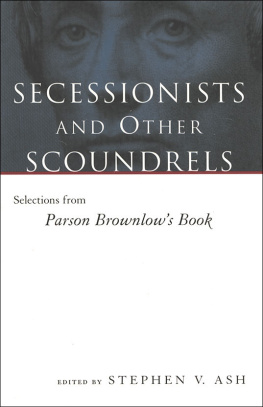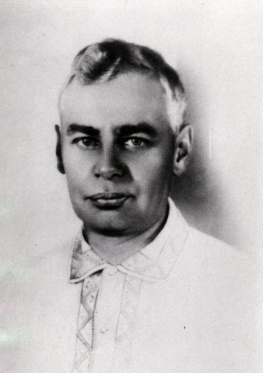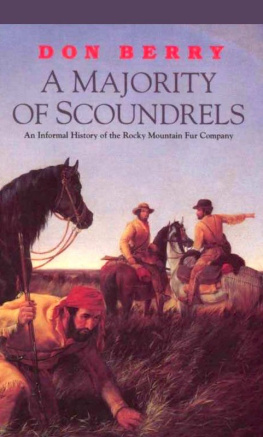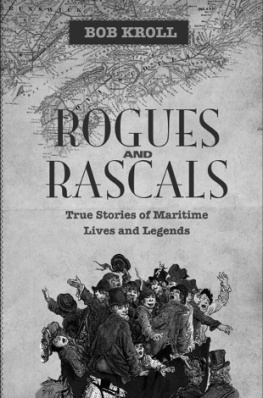Jeff Forret - Southern Scoundrels
Here you can read online Jeff Forret - Southern Scoundrels full text of the book (entire story) in english for free. Download pdf and epub, get meaning, cover and reviews about this ebook. year: 2021, publisher: LSU Press, genre: Politics. Description of the work, (preface) as well as reviews are available. Best literature library LitArk.com created for fans of good reading and offers a wide selection of genres:
Romance novel
Science fiction
Adventure
Detective
Science
History
Home and family
Prose
Art
Politics
Computer
Non-fiction
Religion
Business
Children
Humor
Choose a favorite category and find really read worthwhile books. Enjoy immersion in the world of imagination, feel the emotions of the characters or learn something new for yourself, make an fascinating discovery.

- Book:Southern Scoundrels
- Author:
- Publisher:LSU Press
- Genre:
- Year:2021
- Rating:5 / 5
- Favourites:Add to favourites
- Your mark:
- 100
- 1
- 2
- 3
- 4
- 5
Southern Scoundrels: summary, description and annotation
We offer to read an annotation, description, summary or preface (depends on what the author of the book "Southern Scoundrels" wrote himself). If you haven't found the necessary information about the book — write in the comments, we will try to find it.
Southern Scoundrels — read online for free the complete book (whole text) full work
Below is the text of the book, divided by pages. System saving the place of the last page read, allows you to conveniently read the book "Southern Scoundrels" online for free, without having to search again every time where you left off. Put a bookmark, and you can go to the page where you finished reading at any time.
Font size:
Interval:
Bookmark:
SOUTHERN
SCOUNDRELS
SOUTHERN
SCOUNDRELS
Grifters and Graft
in the Nineteenth Century
EDITED BY
Jeff Forret and Bruce E. Baker

LOUISIANA STATE UNIVERSITY PRESS
BATON ROUGE
Published by Louisiana State University Press
www.lsupress.org
Copyright 2021 by Louisiana State University Press
All rights reserved. Except in the case of brief quotations used in articles or reviews, no part of this publication may be reproduced or transmitted in any format or by any means without written permission of Louisiana State University Press.
Manufactured in the United States of America
First printing
DESIGNER: Michelle A. Neustrom
TYPEFACE: Whitman
Cover illustration courtesy Harpers Weekly.
Jeff Forrets essay How Deeply They Weed into the Pockets: Slave Traders, Bank Speculators, and the Anatomy of a Chesapeake Wildcat, 18401843 first appeared in Journal of the Early Republic 39 (Winter 2019): 709736, and is reprinted here with permission.
LIBRARY OF CONGRESS CATALOGING-IN-PUBLICATION DATA
Names: Forret, Jeff, 1972 editor. | Baker, Bruce E., 1971 editor.
Title: Southern scoundrels : grifters and graft in the nineteenth century / edited by Jeff Forret and Bruce E. Baker.
Description: Baton Rouge : Louisiana State University Press, [2021] | Includes bibliographical references and index.
Identifiers: LCCN 2020034798 (print) | LCCN 2020034799 (ebook) | ISBN 978-0-8071-7219-3 (cloth) | ISBN 978-0-8071-7533-0 (pdf) | ISBN 978-0-8071-7534-7 (epub)
Subjects: LCSH: Swindlers and swindlingSouthern StatesHistory19th century. | CapitalismSouthern StatesHistory19th century. | Southern StatesEconomic conditions19th century.
Classification: LCC HV6698.S67 S68 2021 (print) | LCC HV6698.S67 (ebook) | DDC 364.16/3097509034dc23
LC record available at https://lccn.loc.gov/2020034798
LC ebook record available at https://lccn.loc.gov/2020034799
CONTENTS
JEFF FORRET AND BRUCE E. BAKER
JOHN LINDBECK
ALEXANDRA J. FINLEY
JEFF FORRET
MARIA R. MONTALVO
JEFF STRICKLAND
RODNEY J. STEWARD
JIMMY L. BRYAN, JR.
BRUCE E. BAKER
ELAINE S. FRANTZ
T. R. C. HUTTON
SOUTHERN
SCOUNDRELS
Introduction
JEFF FORRET AND BRUCE E. BAKER
I n 1821, two brothers slunk into Knoxville, Tennessee, where their luck ran out. George and James Welch, alias Goforth, alias Loyd, had arrived from Georgia, where each had reportedly borrowed ... a horse with saddle and bridle, which they forgot ... to return. But the siblings were not merely horse thieves. Their criminality also extended to rudimentary counterfeiting operations. Unfortunately for them, their specious notes were not quite well enough executed ... to pass ... without suspicion. One brother, upon his arrest for attempting to pass counterfeit money, was found to have [a] number of the most base counterfeits on different banks ... in his possession. A local magistrate committed the scoundrel to jail to await trial. Just days later, when two gentlemen from Georgia arrived in Knoxville in pursuit of their purloined horses, town constables rooted out the other brother, still lurking in the vicinity. Upon his apprehension, he, too, was confined to jail, to share a cell with his sibling. As soon as the first brothers trial concluded on the counterfeiting charge, a local newspaper reported, One or both of them will be taken to Georgia to be tried for horse stealing.
The Knoxville paper declared the Welch/Goforth/Loyd brothers scoundrels, although unlike this pair of horse thieves and counterfeiters, not all scoundrels in the nineteenth-century South were necessarily criminals. The region was brimming with clever individuals who pursued the main chance, took risks, wheeled and dealed, shifted identities, ran cons, and exploited cracks in the constantly evolving capitalist system. Economically, some were well-heeled, others poor, but all were ambitious. Some swooped in from the North; others were native. Whatever their origins, these were the menand they were usually menwhose day-to-day economic activities proved crucial to capitalisms transactions and transformations. Capitalism incentivizes innovation, but this positive structural feature is also among its greatest faults. In unregulated, lightly regulated, or underregulated capitalist systems like those of the nineteenth century, opportunities abounded for shady, unscrupulous characters to devise various stratagems to sabotage the economy for selfish purposes while defrauding the masses. Their behaviors in these circumstances were not necessarily illegal but nonetheless unethical. This anthology sets off on a quest to resurrect these scoundrels and grifters who manipulated for personal gain the peculiarly southern capitalist economy of the nineteenth century.
One of capitalisms distinctive features in the region was its connection to slavery, which figures prominently in the essays by Alexandra J. Finley, Jeff Forret, and Maria R. Montalvo. Each of their contributions focuses less on the quantifiable effects of enslaved people as laborers and property and more on the ways that slavery as a social and political system shaped the daily interactions at the heart of what capitalism looked like in practice. Whereas Montalvo examines the subject of fraud and deception in the slave market, Finley and Forret study slave traders relationship to the antebellum southern banking industry. Despite proslavery apologists ubiquitous proclamations of slave dealers as disreputable and peripheral to business enterprise in the Old South, they were in fact financially savvy experts in currency and important conveyors of the multifarious bank notes circulating in antebellum America. The wide distribution of some southern institutions notes propped them up for longer periods of time than if their issue had circulated closer to home, where it could be more readily redeemed. Taken together, these three essays point out the important role of the slave trader in guiding the development of southern capitalism.
The violence that lay at the heart of slavery was itself another recognizable characteristic of southern capitalism. This is not to say that violence was not important to capitalist development elsewhere, as the bloody history of labor clashes reminds us, but that the distinctive character of violence in the South pervades the form that capitalism took there. How could it not? To the extent that we conceive of capitalism as defined by the market and the market as involving actors entering into contracts freely, then violence has no explanatory power. It is an aberration that distorts the market, and in a state that has a monopoly on the legitimate use of force, it is only economically effective around the margins of the economy until it is rooted out. This model might work well enough in some times and places, particularly the United States in the middle of the twentieth century. For the American South in the nineteenth century, however, it is thoroughly inadequate. Slavery was a system predicated on violence, and as scholars such as Jeff Forret, Keri Leigh Merritt, and others have reminded us, this violence was directed at poor whites as well as enslaved people. It follows naturally that violence was one among many tools used to advance peoples economic interests and must be considered an integral part of how capitalism functioned in the South.
Some individuals in the nineteenth-century South made a viable career of violence. Elaine S. Frantz usefully describes these figures as violence workers, and in her essay here, William Faucett can be considered in that category. For him, violence that was explicitly economic, rooted in property disputes, the bootlegging trade, control over womens domestic and sexual labor, or over African American labor, existed on a broader continuum of violence. A more clear-cut example is Alfred W. Burnett and the men he employed to work for corporations in Appalachia, as discussed by T. R. C. Hutton. The rough men bred in the violent, depredated postbellum years who rejected yeomanry and regular wage labor in favor of a mercenary career were crucial to the smooth running of the extractive industry that dominated this part of the South in the late nineteenth and early twentieth centuries, and these men were workers, integrated tightly into the economic order, every bit as much as the men who worked underground to bring the coal out.
Next pageFont size:
Interval:
Bookmark:
Similar books «Southern Scoundrels»
Look at similar books to Southern Scoundrels. We have selected literature similar in name and meaning in the hope of providing readers with more options to find new, interesting, not yet read works.
Discussion, reviews of the book Southern Scoundrels and just readers' own opinions. Leave your comments, write what you think about the work, its meaning or the main characters. Specify what exactly you liked and what you didn't like, and why you think so.






